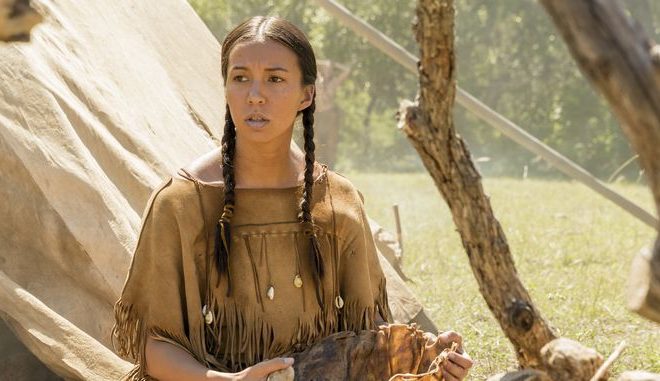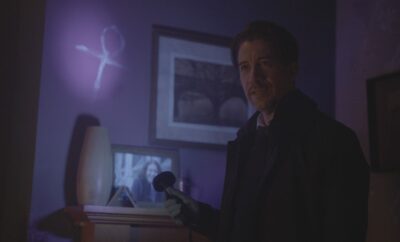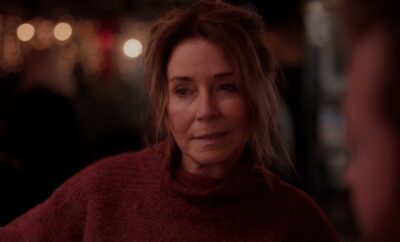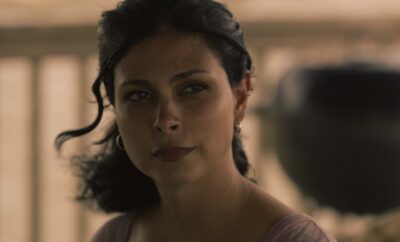 Ryan Green/AMC
Ryan Green/AMC
Interviews
Elizabeth Frances – The Son
By: Jamie Steinberg
Q) What are the recent projects that you are working on?
A) Most recently it was the second season of “The Son.” That’s really exciting. We shot for six months in Austin, Texas. I had a blast out there. I also love theatre so I just at the Marin Theatre Company for this amazing Cherokee playwright Mary Kathryn Nagle. I also workshopped it at an arena stage in D.C. So, it’s been in the works for a while. She’s an attorney and specifically fights for women’s rights in terms of native people. So, she’s an amazing person! My co-creator and I have been working on something called Adherent and it’s a comic book and TV show. We’re just getting ready to pitch. I’m a huge comic book nerd! [laughs]
Q) How was your character of Prairie Flower on “The Son” originally described to you?
A) Oh gosh! Originally, the first season she was described…I think the description was more that she was a young Comanche woman. It was 1849 (this show takes place in turn of the century Texas) and the scenes (because Id’ read the novel) said she was Eli McCullough’s young self’s first love. In the novel maybe she’s in a chapter and then it’s gone. So, they truly expanded this character for the television show. Because of that, I was able to come to it with a lot of the way I saw her. I guess to jump in there, I remember going in for her and getting the sides. I was like, “This is so amazing! I’m so excited! This is great material, but none of it is in English!” On the page it was in English, but very often (especially with actors of color) things aren’t translated. So, I ended up going the next day into Sharon Bialy’s office and did the sides in three languages – Comanche, Spanish and English. I, personally, only speak English. So, I’d had a lot of experience of learning languages for work. When it came to Prairie Flower and how she evolved…I remember the first day on set saying to one of my producers while doing the makeup test, “You know, I really want her to feel like she’s of the earth. It’s 1879. It’s about survival. It’s not about beauty.” I just wasn’t interested in that for her. I just wanted her to feel authentic. So, we got to go down that route. I think, especially in the world as it is today, allowing women on screen to be as complicated and unglamorous, it actually makes us more dynamic and interesting so that when we choose to be beautiful it’s truly a choice versus responding to a societal need. That was really my take on her. She’s seventeen in the first season and trying to survive. She’s been adopted by this particular band of Comanche, even though it is one tribe technically there were so many different bands of Comanche. I guess it’s in the way that you would say people of the Latin X community consist of people from Mexico, people from different countries in Latin America, etc. In the same way, Comanches operated in this way. So, for Prairie Flower her family was killed pretty brutally by white Texans who were coming in to Texas. She survived with this band that she lives with when we find her in the series. It’s the band of Comanches that adopted her. So, I think it makes her love story with Eli pretty complex because he’s a white man coming into their tribe, but I think where they meet and find each other is in that human experience. They both have a foot in and a foot out of this world. He’s been adopted into this band of Comanches as well and his family was killed. I think that’s where they are kind of like their meeting point and that’s where that need for understanding begins and their love starts.
Q) Since she is so sparsely mentioned in the book, have you had much of say in how she developed on screen?
A) Yeah, sure. Initially it wasn’t the case. I think any project you come to you wonder what your role is in it. Especially when playing and representing truly under represented people on screen, I think there is an extra responsibility and opportunity there. So, as we went on with the first season and the second season comes out, I think it truly reflects there. Our showrunners and writers were not just responsive, but eager to listen, which was really unique. I give them a lot of credit because I think they saw it as an opportunity as well as the story grew to say, “Yes, it’s the story of Eli McCullough, but who is this woman?” In the book, what you do understand is her (not spoiler alert) dad really launches him into becoming this dark, haunted man. I had told them, “If she is the thing that changes his world for forever it means that the love and the relationship has got to be really real.” I think that brings its challenges, especially in a historical piece which we all worked through together. Meaning there is a lot of history that hasn’t been told in America when it comes to any marginalized group, especially in this case native people’s that our writers room wasn’t aware of. So, I’m looking it through the lens of today and going, “I think that option is possibly detrimental to being one of two shows (at the time it came out) that have characters like these that are regulars. So, how can we be as truthful but as responsible as possible and just make sure everything we do on this series is a step forward?” Especially as you see her evolve towards the latter part of the second season, I think the evolution came out of a true collaboration between the writers and I and the network listening. A lot of our extras came from the Comanche Nation in Oklahoma. So, they made a huge effort to say “we want to do it right” and it’s never perfect, but it is always like, “We can make this an inclusive conversation so we can learn from each other.” I feel like that’s the way to move things forward with whatever group is trying to tell these stories.
Q) Did you do much research into Comanche tribes in the 1800’s?
A) Yes, absolutely. When we first got to Texas we had a little time. I approved a leave and we had a Comanche consultant Juanita Pahdopony from Oklahoma. I asked her, “Can I come stay with you?” [laughs] She said yes, so I went out there from Austin to Oklahoma. I drove myself out there and stayed with her and her husband. We became very close very quick. I learned the language and met a lot of the leaders in the Comanche nation. I wanted to do my due diligence and also understanding their point of a view on a story like this because each tribe is so different. Being with her and being out there and amongst Comanche people I think made a huge difference and turned up the fire in me to want to do my best with what I had to give them something they are proud of.
Q) Talk about working with costar Pierce Brosnan.
A) Oh my gosh! Pierce is such a lovely guy! I think a lot of times when you are working on a TV show or film, who ever is in that #1 spot sets a real tone and Pierce set a tone absolutely that was, “Hey! Let’s all come have a good time and do our work!” Because of that, we truly all became like this all big family out of Texas since we were all living there. And that’s inclusive of several timelines that we’re running. So, we weren’t all working together all the time. When we would hang out together, we would all have meals together and come visit each other and see one another work. I feel like Pierce was a big part of setting that town. Also, our showrunner Kevin Murphy is just like the loveliest human being.
Q) What were some of your most memorable moments on screen or behind the scenes from filming “The Son?”
A) Truly, I think comradery. I think one of my favorite moments maybe ever was when we had all these young people on set that were bussed in from the Comanche Nation who had never been on set and, for me, especially being a series regular for the first time going, “I can shift the dynamic here.” I knew everybody and knew everybody’s name. We had these riders in from Montana and these guys were amazing! It’s called “Indian Relay” and these guys would jump off a horse, run, then from behind the horse they jumped up and over the horse and land on it. These aren’t even their horses! No saddle. Then, they take off. They had done this scene and there was a little girl who was like, “How did that happen?!” I said to her, “Do you want to see?” So, I brought her over to the monitor and by the end of the day all of the Comanche kids were over by the monitor. Our showrunner had like her on his shoulders so she could see and it was really touching because truly there was no divide because we’re all there trying to achieve something together. I would say that was one of the most memorable moments. Jacob Lofland, whom I work very closely with on the show, really became like my brother. Especially over the second season we became very close. When we got towards the finale, we had a table read (without giving plot away) and everyone got emotional. I really looked around and thought, “This is special. This doesn’t happen all the time.” We really cared about each other and I think that also bled into our characters, for sure.
Q) What can you tease is in store for Prairie Flower in Season 2?
A) I can tease a lot of love and a lot of tragedy. [laughs] Definitely the stakes are higher and a loss, I think. Even though it’s a historical drama there will be a lot more that is topical and pretty relevant to what is going on today. I’m being careful with what I can say as to not give it away. [laughs] Yes, I think you’ll see that in Phineas (David Wilson Barnes) for sure and Eli and Prairie Flower’s story. I think the struggle of this man with who he has become. Whereas, the first season was really setting a lot of that up I think the second season is no holds bard. [laughs]
Q) You are a part of social media. Are you looking forward to the instant fan feedback you’ll receive to the season?
A) Yeah, definitely! I always look forward to the fan feedback. Especially since it’s been a longer wait for the second season and I’m grateful for the fans that are like, “I’m still going to watch! I’m so excited!” [laughs] So, I look forward to it. I also think there is going to be a lot of sadness and disappointment. [laughs] In a good way, but in a tragic way!
Q) Is there anything else you want to be sure we share with our readers about this season of “The Son?”
A) Tune in and share your feedback! I’d love to hear it on social media what people think.
Q) What would you like to say to everyone who is a fan and supporter of you and your work?
A) Just a big thank you! Thank you to everyone, personally and professionally, and the fans who have been so supportive. Especially in a time like now where content is really becoming truly diverse and inclusive, I think it’s a really exciting time to hear new kinds of voices and to hear that people want to hear those voices or are interested in those voices and my participation (especially as a person who is mixed race) to get to be a part of that is really, really exciting. So, I hope that we get to hear stories like these that are historical, but also, I really look forward to seeing stories that are inclusive that are modern and futuristic. What do they say? By the year 2049 the world is going to be more mixed than that. [laughs] We’re all human. We’ve got to figure it out!





You must be logged in to post a comment Login